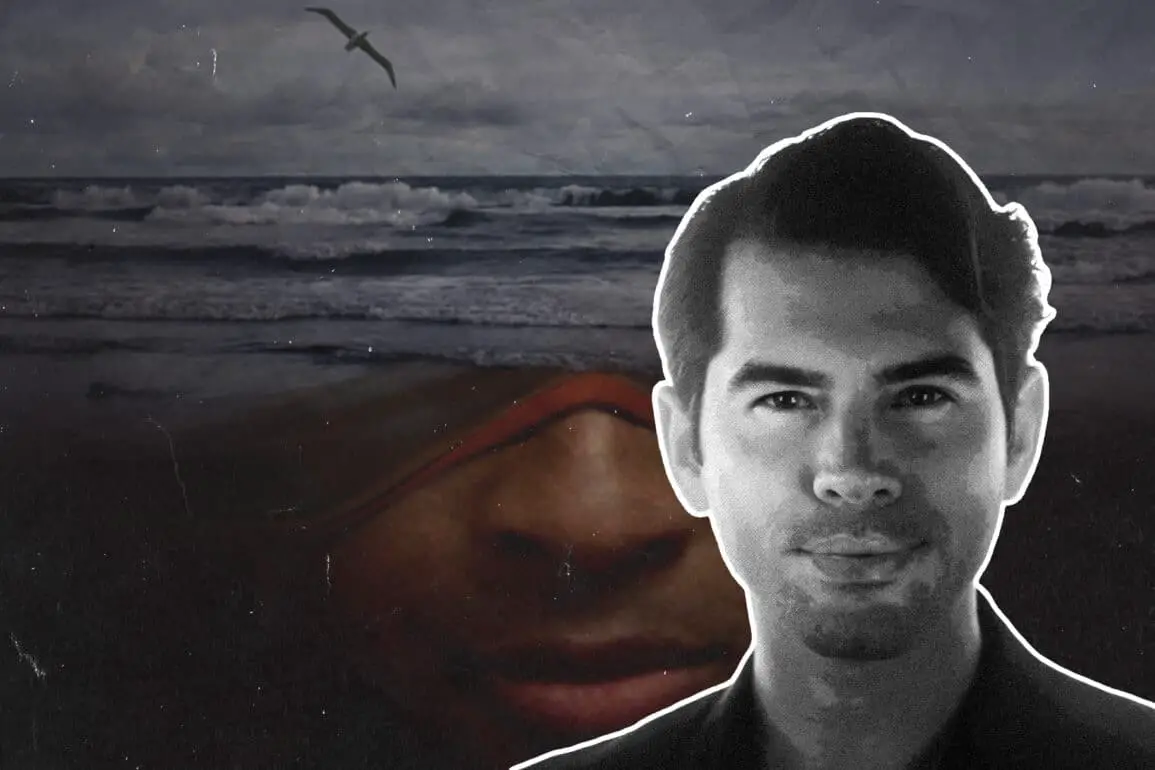How did you start your career as a filmmaker? What inspired you to work in the entertainment industry?
Cliché, as it may sound, I’ve been interested in making films since I watched Jurassic Park for the first time as a kid. Thankfully, my parents encouraged creativity, enabling my participation in the visual arts, performance dance, film camps and acting programs; we even made a 30-minute “short film” – a murder mystery set in the 1930s – when I was in grade-school. But it wasn’t until later, after college and an overseas career in finance, that I decided to tap into those creative roots and pursue filmmaking. And despite the detour abroad and relocation to LA, I returned to my childhood home, the same one we filmed that first short in grade-school, to create ALBATROSS, my feature directorial debut.
Congratulations on your film, Albatross! Can you tell us more about this project? What made you want to tell this story?
Thank you, I’m very proud of how positive the audience response has been and how well the film’s done on the festival circuit.
After leaving my career in Investment Banking and Private Equity in Singapore, I moved to LA with a plan of completing two shorts and a feature length film. After completing POPPIES in 2018 and ERIN in 2019 (both of which are available on Amazon), I knew it was time to take the plunge and write a feature length film, which ultimately turned into ALBATROSS.
From a production perspective, ALBATROSS really came about because of the COVID restrictions enforced during the Global Pandemic. In 2019, my producing partner, Jennie Lew Tugend, and I had been developing another project in LA, but when the pandemic hit that was put on hold. I returned to Canada with my backpack and carryon – thinking it would be a few weeks – but soon realized it would be a lot longer. Jennie and I talked about strategy, and I suggested a pivot – starting a new project to film in my hometown. This evolved into ALBATROSS.
Were there particular circumstances or personal experiences that shaped the narrative? How do you think this project will change and make an impact in today’s society?
As a writer/director, personal experiences and sentiments are laced throughout my work, but in the case of ALBATROSS, these sentiments may be more nuanced or under the surface than other indie-dramas. Throughout ALBATROSS and its characters, there’s a throughline of authenticity that explores the potential consequences of making compromises. This idea of social acceptance is very much a part of the LGBTQ+ experience, and I hope that these themes resonate with the audience.
I went into ALBATROSS with the intention of writing a diverse and inclusive film, that also explores gender and age differences, race-bias and socio-economic status. As a result, there are nuanced discussions about the generational impact of trauma. Hopefully ALBATROSS can help break down some of the barriers that deter us from discussing it and encourage conversation.
Can you walk us through the process of preparing for your role as a director? What were the challenges and breakthroughs you’ve encountered along the way, and how did you overcome it? What was your biggest takeaway from this experience?
Transitioning from short films to a feature length film required modifying my preparation process; not only in terms of the volume of work (that is, more script pages to prepare), but also in its complexity (more depth in story points, character relationships, etc).
I worked closely with each department in pre-production to build the world and the characters. Cinematographer, Dylan Chapgier, and I developed the visual style of the film, which includes everything from story-boarding and finding the frames, lighting style and blocking. Costume Designer, Christopher Puanil, and I developed the visual style for each of the characters, and made sure they would work well with the Hair and Make-Up designed by Amber Bentley and also fit into the physical environments I created in the production design process. I also entrusted Producer, James Mark to ensure we’d make it through production.
There’s a famous saying in Hollywood that directing is 90% casting. What was the dynamic like between you, your actors, and film crew? How was the casting process?
I couldn’t agree more, and I try to cast as authentic to the character as possible. Creating a film takes a village, and the incredible cast of ALBATROSS was assembled by Casting Directing, Ashley Hallihan. We had an incredibly short casting window (less than two weeks), and we reviewed hundreds of submission tapes from across Canada. We had a very limited call-back window, which was also conducted by Zoom, and ultimately, I had to trust my GUT in selecting the cast that most closely reflected the characters I had written. By nature, the story and script parallel a stage play, and I knew it would be important to tap into Canada’s rich theatre community and I am so thankful we did. The nuanced performances by Sarah Orenstein, Romaine Waite, David Keeley, Katherine Gauthier and Thom Nyyhus not only brought the characters to life, but elevated them.
Were there circumstances in which you had to make difficult artistic choices or alter scenes/storylines due to factors such as accommodating individual needs/requests of participants and/or the crew, audience feedback, production limitations etc. If so, how did you compromise and make it work?
From script to final film there were a few adjustments that altered the storyline, but those weren’t due to any individual requirements, rather part of working through the editorial process. We went from first draft to production in a matter of months, so several scenes were cut or altered in editorial to accommodate shifting tone and to streamline and focus storylines.
What films and which filmmakers have been the most inspiring or influential to you and why?
Bringing the audience on a visual journey is an important part of filmmaking and I enjoy and admire filmmaker’s who do that in their work. I appreciate the way Adrien Lynn creates an unsettling tone. Alternatively, I deeply respect both Steven Spielberg, James Cameron and Guillermo Del Toro for their world-building and story-adventure – different genres, different worlds, but always a journey!
How did film festivals, filmmaking competitions, fellowships, etc. play a role in your career?
Hard to identify the singular impacts, but definitely relationship building and meeting other creatives…. Building my own profile as a filmmaker.
Although it’s hard to identify the singular impact, festivals encourage relationship building with other industry professionals, meeting other creatives and building your brand as a filmmaker.
Festivals and accolades are an important part of praising the collective and individual contributions of the entire team. Filmmaking truly takes a village. The festivals and award not only prove hard work pays off, but also shows how important team work is in elevating concept and execution. I am proud that ALBATROSS has been recognized critically across multiple categories, and in addition to Best Film, Best Writer, Best Director, we have also been recognized for Best Actor awards across all four leads in the ensemble (Sarah Orenstein, David Keeley, Romaine Waite and Katherine Gauthier), Best Cinematography for Dylan Chapgier and his team, as well as Best Editing for Mariana Benevello. This reflects the quality of work by an extremely talented team.
The pandemic has greatly affected the entertainment industry. How did it affect your side of things?
Completely, as I mentioned earlier (Q2), ALBATROSS, really came about because of the Global Pandemic.
There were also major impacts on our production because of COVID (i.e./ following COVID-protocols). We were so early into COVID when filming that a lot of the rules were in place, but not yet tested – kind of like the Wild West. Producer, James Mark got us through production COVID-Free.
What were the monumental life lessons, mistakes, and things you’ve learned throughout your career that you would like to share with aspiring or emerging female filmmakers and/or creatives in general?
I’m pretty new to the film game, still learning and navigating the industry. One thing I try to encourage in my students at Toronto Film School and UCLA Extension, is that when it comes to creativity, don’t let others tell you, “NO.”
Another important skill to develop pertains to getting feedback in the creative process; learn to distinguish between more objective feedback (i.e./ logic problems in your story) and subjective feedback (i.e./ personal preferences over character traits, dynamics, etc.), and also evaluate where the feedback is coming from (i.e./ if you’re writing a romance and the feedback comes from a horror writer – it may not be the most valuable critique).
What do you think the future of filmmaking would look like? What kind of stories do you think will emerge and capture the attention of producers and executives?
There’s a lot of industry conversation about this topic right now. The landscape has changed so much in the last 10 years, and it’s becoming highly fragmented – an explosion in content creation and format, and audience expectations – which is great for opportunity. The flip side, is that content is both created and consumed fast – so even though there are a lot of stories being told, they aren’t necessarily being consumed. It would be great to see larger investment in ever-green quality projects that have a life-span longer than opening weekend box-office – Top Gun: Maverick, Elvis and Everything Everywhere All at Once are great signifiers that it’s possible!
I also think, social media plays into current confusion, many think short-form content is a substitute for long-form media, but I disagree. I just think the addition of TikTok and similar platforms expands the pie, rather than eats into it.
What’s your advice to aspiring filmmakers who want to break into the entertainment industry?
Create situations that allow you to explore story-telling and develop your skillset.
What kind of legacy do you want to leave behind as a filmmaker?
Stories that inspire conversation. The willingness to have conversations with those who are not cut from the same cloth is so important, perhaps now more than ever. Everyone has a story and a background that shapes their views, ideals and comfort levels, and conversation is such a great way to connect with others who have a different life experience. ALBATROSS shows some of the stories that shape who we are and underscores that we aren’t always what we appear on the surface. Our feelings about each of the characters changes throughout the film, as we peel back the layers of their individual stories.
Do you have other upcoming projects you want to share with us?
Following ALBATROSS, I’ve got a couple exciting projects in the pipeline.
Firstly, THE BARRACUDA ALCHEMIST follows a queer, struggling artist, as he navigates the elite LA-scene. A dark character-driven drama, the film explores identity, sexuality, judgment and corruption.
Secondly, I’ve collaborated with Kevin Kreider (Netflix’s BLING EMPIRE) to develop the diverse and inclusive romantic comedy, CHASING TIDES. The film focuses on an egotistical actor plagued with a bad reputation that must date a do-gooder to improve his image and land a dream role.




